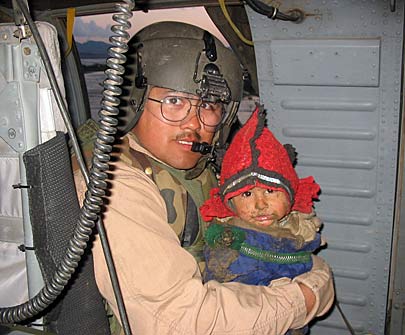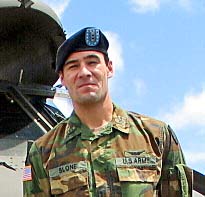Chief warrant officer talking about the change in Afghans' attitudes

|
Wheeler crew saves day
A Wheeler Army Airfield UH-60 Black Hawk helicopter crew helped evacuate 400 civilians from unseasonable spring heavy rains and flooding last month in Afghanistan.
![]()

![]()
Michael Slone
"We were preparing to take off," said Slone, who has been a helicopter pilot for the past 12 years, "when the mission changed and we were asked to do a reconnaissance of flooding in an area 120 miles northwest of Kandahar."
The weather had caused massive problems across the country with continuous torrential rains and melting snow that the clay-like soil couldn't absorb.
"We had been in the area before," said Slone, 31. "There is a river, which is normally located 100 meters (330 feet) on the eastern side of the village.
"The weather had been warming up and the melting snow had caused the rivers in the area to flood. It also was raining pretty hard. The water was moving pretty fast and it looked really cold."
Co-pilot 1st Lt. Jonathan Ewing said that as his helicopter reached Deh Rawod, he noticed that "the walls of the river was really high."
Slone said the rising water had more than tripled the size of the river with the village caught in the middle. "The village now was about the size of Wheeler with streams of water running through it. There was about 300 meters of water on either side of the village."
News reports at that time said rainfall totals for that month was nearly 2 inches above the average for that time of the year.
There was about 20 minutes of daylight left when the helicopter reached Deh Rawod.
"We did a couple of passes and saw there was about 300 to 500 people who were stranded," Slone said.
At that point, Ewing requested the assistance of at least two larger CH-47 Chinooks and another UH-60 Black Hawk.
Slone said he saw a gathering of people of about 100 people in a marshy part of the "island" and put his helicopter down near them.
"People were huddled together on the islands created by the river," Ewing, 24, added.
Sellers and his team, which included an interpreter, went to tell the villagers how they planned to evacuate them to higher and safer ground.
"We piled in as many people, most of them women and children," Ewing added, "that we had space for."
Slone's Black Hawk was able to make six trips, evacuating about 120 people -- most of them women and children, before he had to leave because his crew didn't have night vision goggles.
However, before the night was over two other Army helicopters were able to transport about 300 to 350 other villagers to safety.
Slone doesn't know exactly how many villagers were affected by the raging waters, but news reports then indicated that as many as two dozen people died that day.
Ewing, who deployed to Afghanistan last year directly out of flight school, described the humanitarian mission as "the highlight" of his tour.
"It was definitely worthwhile," Ewing added.
He said his two crew chiefs were "elated that they could do something that really made a difference."
During the winter, Slone, who lives in Ewa Beach, said his crew and other aviators with Alpha Company made dozens of humanitarian missions, dropping food, clothing and blankets to those cut off by snow or blocked roads.
The unit, normally stationed at Wheeler, deployed with 30 helicopters that were split between Kandahar and Bagram Air Base.
Slone noted a change in the attitude of people in the area.
"When we first got there," Slone said, "people would throw rocks at us. By the time we left, they were just waving their hands."
[News] [Business] [Features] [Sports] [Editorial] [Do It Electric!]
[Classified Ads] [Search] [Subscribe] [Info] [Letter to Editor]
[Feedback]
